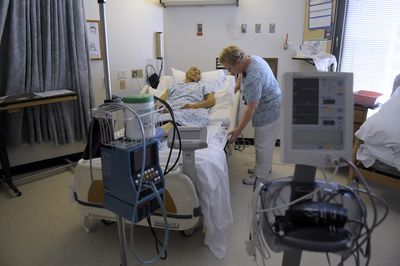Hospitals watching market
Sacred Heart, Deaconess moving forward – so far

The economic crisis is squeezing hospital expansion projects and equipment purchases at a time when medical centers are full of patients and bound to get busier as Americans age.
It’s a problem that has Sacred Heart Medical Center watching the markets with a wary eye as the Spokane hospital plans for a $175 million addition next year.
“You bet today’s capital markets are concerning to us,” said Mike Wilson, president of Sacred Heart. “But we’re in a good position and will continue to move ahead with our planning.”
The credit freeze won’t alter spending plans at Deaconess Medical Center, where new owner Community Health Systems expects to buy $11.5 million in equipment by the end of the year.
But credit problems have made lenders so skittish that even municipal bonds – normally a safe haven – have become difficult to sell.
“Hospitals all over the state and all over the country are having trouble raising money right now,” said Cassie Sauer, of the Washington State Hospital Association. “It’s a fairly universal experience: They can’t sell bonds because nobody is buying them. Even highly rated bonds – good investments – are not getting sold.”
She said about a dozen large and small hospital projects in the state are on hold.
Hospitals are thought to be better insulated from the problems plaguing Wall Street than other businesses because people always get sick and injured, and private insurers and the federal government provide steady reimbursements.
Still, many hospitals are evaluating their expansion plans because of fears that a prolonged recession could result in heavy job losses and more uninsured patients.
Economic problems have afflicted Southwest Medical Center in Vancouver, Wash. The interest rate on a $115 million bond package issued four years ago for construction purposes doubled to 5 percent, according to a report in the Los Angeles Times, as the market for such investments evaporated.
The hospital is attempting to borrow $140 million to refinance that debt, according to state records.
Those hospitals that secured financing earlier this year are considered fortunate.
MultiCare Health System in Tacoma, which operates Tacoma General and several other hospitals, borrowed $437.5 million in May to refinance debt and pay for a $120 million building at Good Samaritan Hospital in Puyallup.
“We’re good at this point,” spokesman Todd Kelley said. “We’re glad we went to the market when we did.”
Donna Fincke, executive director of the Washington Health Care Facilities Authority, said it hasn’t had a bond issuance fail. “But we haven’t taken anything to the market recently, either,” she said Tuesday.
The facilities authority is a conduit that allows nonprofit hospitals in Washington state to sell tax-exempt bonds for capital improvements including construction projects and equipment purchases.
In the past 34 years it has issued more than $7.5 billion in bond financing.
Community Health Systems, which bought Deaconess and Valley Hospital and Medical Center, is required to spend $100 million on new equipment and building upgrades within five years. The money is already flowing, said Dennis Barts, the new chief executive officer at Deaconess. The $11.5 million Community Health will spend this year includes patient monitors throughout the hospital and 220 beds – enough to fill 30 semi-trailers. The modern beds will make an immediate difference in patients’ safety and comfort and help the hospital reduce pressure sores, a problem that has nagged Deaconess for several years, said chief nursing officer Shelley Peterson.
Because Community Health is a for-profit company, it cannot raise money by selling tax-exempt bonds.
No matter, Barts said.
The nation’s largest publicly traded hospital company deals directly with banks and has the ability to fund capital improvements at its 119 hospitals by borrowing, tapping reserves or selling shares of company stock from the corporate treasury.
“We’re in a good position,” Community Health spokeswoman Rosemary Plourin said. “You won’t see any impact on our commitment to the Spokane community.”
Yet the company has not escaped Wall Street’s troubles.
Shares closed at $18.60 Tuesday, down from $30.54 a month ago. Community Health is scheduled to report earnings Oct. 30.
Sacred Heart’s Wilson said the hospital’s merger with the larger, Seattle-based Providence Health and Services has made it financially stronger. Regardless of economic uncertainties, Wilson said, Sacred Heart is well positioned.
But that doesn’t mean it would be easy to handle, he cautioned, if lots of people postponed elective surgeries or the numbers of uninsured swelled. But even if challenges arise, “we’re the safety net, and we will continue our mission as we’ve always done.”